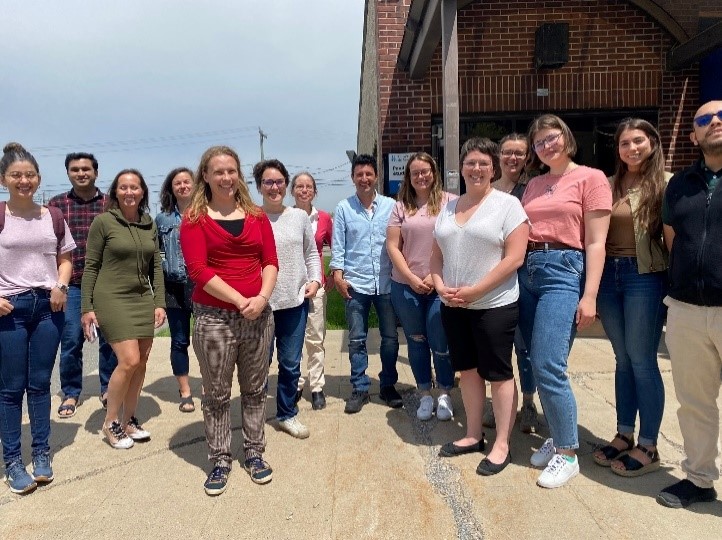2022-2023 Activity Report
An overview of the GREZOSP
unique research group located in the only francophone veterinary medicine faculty in America
veterinary public health pavilion where professionals from two federal agencies and the FMV collaborate
members representing about fifteen institutions and organizations
Message from our director
It is with great pleasure that I present to you this GREZOSP annual report.
The report we present to you is that of a busy year, but we are not complaining! While some of you have been overwhelmed with the management of avian influenza H5N1, others have been heavily involved in the ongoing management of the COVID-19 pandemic. Despite all this, we had the great pleasure, this past year, to resume social meetings and face-to-face activities.
In addition to our social activities among members, we contributed to the organization of several scientific events, such as the annual scientific congress of the Centre de recherche en santé publique (CReSP) in Saint-Hyacinthe and the symposium « Mieux travailler ensemble pour un monde en meilleure santé» organized by the Club étudiant pour Une seule santé. We also participated in the organization of two other events that will be featured in next year’s report.
The past year has been marked by great strides for the One Health approach. The Initiative Une seule santé de l’Université de Montréal has now been launched, and we have contributed to it. I am deeply satisfied to see the growing awareness of our approach. I have participated in several events in this regard. Last fall, I was invited to give a presentation at the Colloque Une Seule Santé organized by the University of Calgary and the Royal Society of Canada.
I was also invited to present and explain what the One Health approach is at the Engagement Forum for Partners and Stakeholders of the Pandemic Preparedness Instrument, following the opening of the day by the Deputy Minister of Health, Dr. Stephen Lucas. This forum brought together several federal agencies, provinces, territories, indigenous partners, and civil society organizations to facilitate intersectoral dialogue on pandemic prevention, preparedness, response, and recovery. The event is part of Canada’s participation in the development of an international pandemic instrument. One of the topics discussed was the One Health approach for pandemic prevention, preparedness, and response.
On a more down-to-earth note, the work within our executive committee has been heavier this year due to the absence of our coordinator, but we have managed to maintain the services. We now know that we will no longer have the opportunity to count her as part of our team, so we will soon be recruiting a new resource, which should facilitate our functioning for the coming year.
I hope this activity report is enlightening and enjoyable to read. Happy reading!
Hélène Carabin
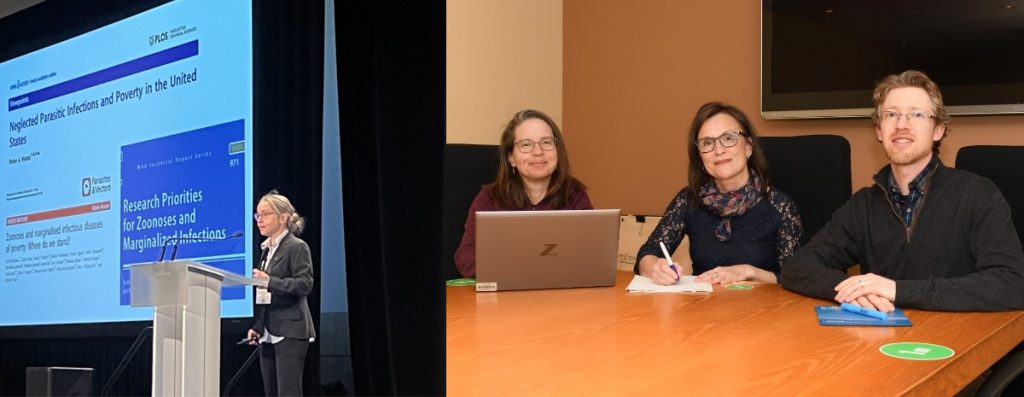
Spotlight on GREZOSP-supported student research projects
Katrina Di Bacco, a PhD student under the supervision of Hélène Carabin, a professor at the Faculté de médecine vétérinaire and director of GREZOSP, and co-supervised by Cédric Yansouni, a professor at the Faculty of medicine at McGill University.
« Estimation de la fréquence des zoonoses parasitaires négligées au Canada »
Parasites such as Taenia solium, Toxocara sp., Toxoplasma gondii, Echinococcus sp., and Baylisascaris sp. are responsible for globally significant parasitic zoonoses. In Canada, there is limited data on the prevalence of these parasites.
Katrina’s project aims to estimate the frequency of these parasitic zoonoses in humans and animals. To achieve this, she will review scientific literature to gather data on these zoonoses in Canada. Subsequently, to determine the seroprevalence of selected infections in the Canadian population, she will analyze sera from the Canadian Health Measures Survey (CHMS) biobank, which collects health measurement data from Canadian residents. She will also examine the influence of variables such as age and sex, among others, to identify risk associations.

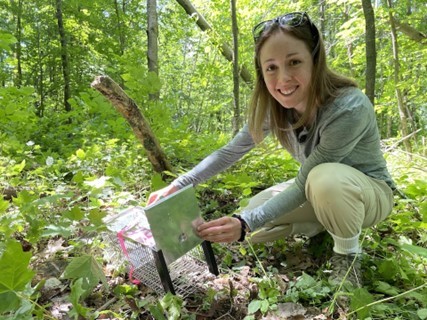
Raphaëlle Audet-Legault, a master’s student under the supervision of Catherine Bouchard, a researcher at the Public Health Agency of Canada (PHAC), and co-supervised by Cécile Aenishaenslin and Jean-Philippe Rocheleau, professors at the Faculté de médecine vétérinaire:
« Éco-épidémiologie de l’anaplasmose dans l’environnement péri-domestique en Estrie ».
Her project aims to study the reservoirs of human granulocytic anaplasmosis (HGA), a vector-borne disease caused by the bacterium Anaplasma phagocytophilum, which is emerging in Québec. The zoonotic variant known as “human active” (Ap-ha) is pathogenic to humans, horses, and dogs.
During her project, she intends to determine which species of wild micromammals can be considered competent reservoir hosts of the Ap-ha variant, which is currently unknown in the Canadian context. The study will take place in peri-domestic wooded sites in the Bromont region during the summers of 2022 and 2023, where live capture of rodents and tick collection will be conducted. This project adopts a One Health approach, integrating ecological and epidemiological concepts to better understand the emergence of HGA and guide the development of interventions in human and animal health.
Student Club for One Health
The “Club étudiant pour Une seule santé (CÉ USS)” is an active partner of the Initiative Une seule santé de l’Université de Montréal that was created by students from various disciplines such as biology, veterinary medicine, public health, and others. They apply the One Health approach in their research activities. The mission of the club is to promote the transdisciplinary and holistic One Health approach among the student community at the Université de Montréal and various partners.
The club organizes student symposiums during different events to promote the One Health approach and initiate projects in line with this approach. For instance, the symposium held on November 4th, 2022, titled “Mieux travailler ensemble pour un monde en meilleur santé”, brought together a panel of experts and students from various disciplines who gathered to discuss the One Health approach and facilitate its implementation within their institutions and projects. The club also holds workshops to popularize the One Health vision among undergraduate students.
For more information, please visit their website: https://www.club-uss.ca/
Awards and grants
The GREZOSP is strongly committed to supporting its graduate students. Since its establishment in 2015, the GREZOSP Scholarship Program has distributed over $150,000 to its students, both for their recruitment, end-of-program support, and to enable them to present their findings at international conferences. Many of these graduates are now working as professionals in Québec within organizations such as the PHAC, CFIA, and INSPQ, as well as in France and Niger.
In 2021-2022, the GREZOSP launched its new recruitment scholarship program to promote new talent and support the training of a new generation of researchers and professionals in the field of veterinary epidemiology and the One Health approach.
The recipients of the master’s or doctoral recruitment scholarships, each one of $15,000 for 2022-2023, are Katrina Di Bacco, a doctoral student under the supervision of Hélène Carabin, and Raphaëlle Audet-Legault, a master’s student under the supervision of Catherine Bouchard.
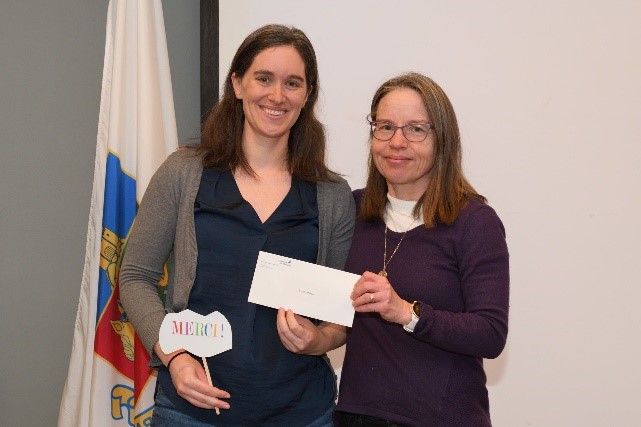
Internship scholarships are also available for projects focused on the epidemiology of zoonoses and population health within a One Health context. A $3,200 scholarship has been awarded to Katherine Albert.
The GREZOSP has also established conference scholarships to support student travel and registration for conferences related to the GREZOSP’s mission. This year’s winners, Agathe Allibert, Laurence Daigle, Natasha Bowser, Nikky Millar, Sarah Mediouni, and William Donnely, received a combined support of $6,500.
In addition, students who are members of GREZOSP are eligible for public health awards and scholarships awarded by the Faculté de médecine vétérinaire during the Annual Awards and Scholarships Ceremony 2021-2022, which took place on March 23, 2023. The Lucie Besner Scholarship of $5,000 was presented to Katrina Di Bacco, a doctoral student under the supervision of Hélène Carabin. The Agria Foundation Prize of $15,000 was awarded to William Lelorel Nankam Nguekap, a master’s student supervised by Juan Carlos Arango Sabogal. Benjamin Jacobek, a master’s student under the supervision of Jean-Philippe Rocheleau, received the Zoological Society Prize ($4,152).
Finally, the Lucie-Dutil Award, ($500), was presented by GREZOSP to Ariane Dumas, a doctoral student under the supervision of Patrick Leighton.
Workshops organized by the GREZOSP
Systems Approaches Workshop
On March 13th and 14th, 2023, GREZOSP organized a workshop on systems approaches. The workshop was conducted by Chloé Clifford Astbury, a postdoctoral researcher at the School of Global Health, University of York in Toronto. Her current work focuses on applying systems approaches to the prevention of communicable and non-communicable diseases, with an emphasis on participatory and qualitative modeling of systems.
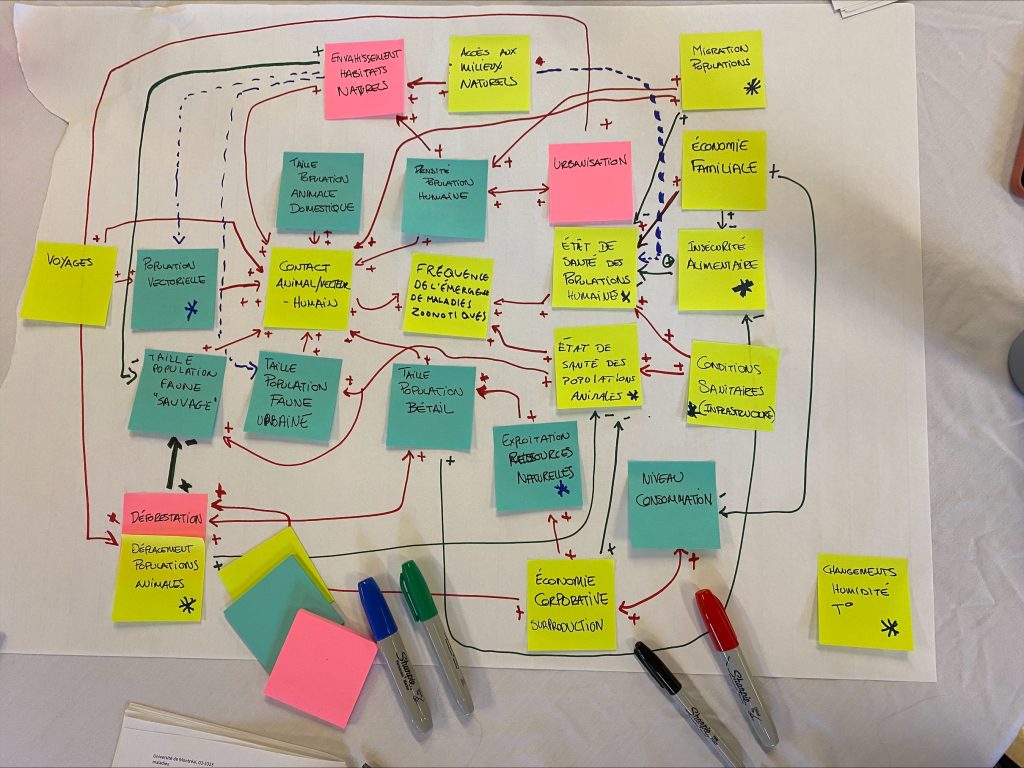
During the workshop, Chloé provided an introduction to systems approaches, a set of approaches and methods for studying complex phenomena as systems and understanding how they are interconnected and influence each other. The workshop participants had the opportunity to engage in an interactive session exploring the question, “What are the key variables that impact the frequency of zoonotic transmission events?” They created system maps, time behavior graphs, and developed intervention scenarios.
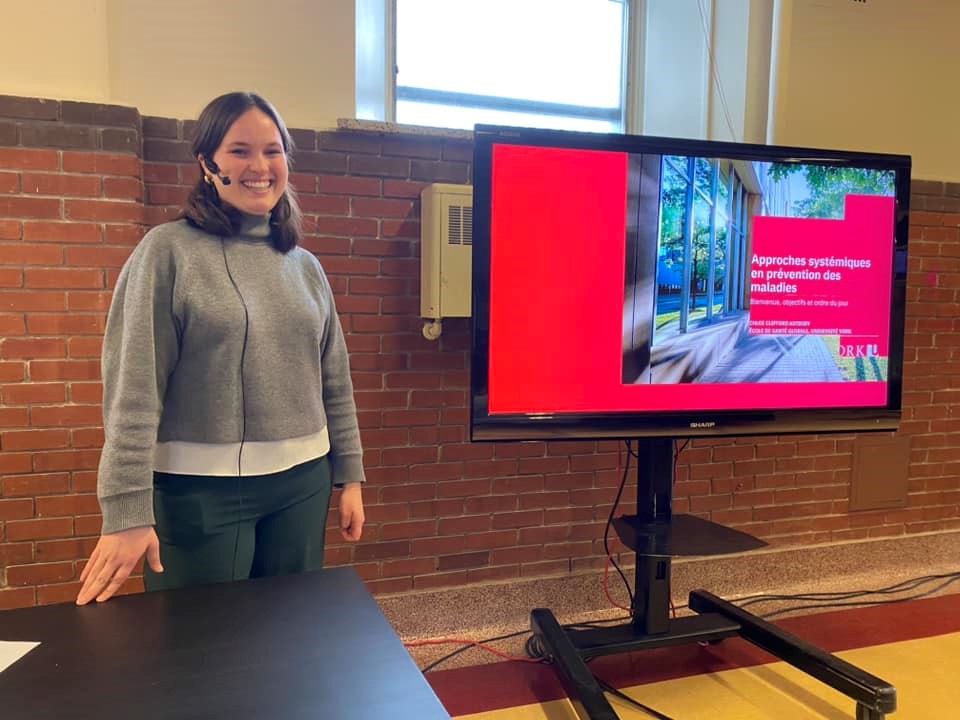
Social Media Workshop
On March 10th, 2023, Thomas Milan, specializing in scientific communication and popularization to promote access to science for the general public, offered a workshop on effectively using social media as a scientist.
Social media platforms have become essential communication tools for the scientific community, allowing researchers to share ideas, create collaborations, and communicate research findings. During this workshop, participants had the opportunity to explore different social media platorms, learn how to create effective content, and develop their online presence.
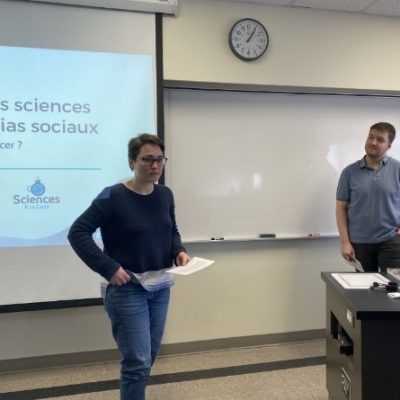
GREZOSP Events
Social Event on May 26, 2022
The sunny days inspired Daryna Kurban, a doctoral student from GREZOSP, to organize a gathering for members to enjoy a shared meal. It was a wonderful gathering after a prolonged isolation due to the COVID-19 pandemic.
The event provided a great opportunity for professional networking and getting to know new members.
Léa Delesalle, a doctoral student from GREZOSP, also took the opportunity to present the “initiasciences” project, a nonprofit organization she helped establish in 2021. The project aims to introduce people to research and is supported by various institutions (CEGEPs, research institutions, etc.) and the NovaSciences program of the Ministère de l’économie et de l’innovation, which won the local OSEntreprendre Challenge in 2022.
CReSP congress
This year, the Centre de recherche en santé publique (CReSP) held a day of its congress at the Faculté de médecine vétérinaire. Researchers and students from GREZOSP (Groupe de Recherche en Epidémiologie des Zoonoses et Santé Publique) were excited about the opportunity to create new connections under the theme « Regards croisés sur la santé et l’environnement ».
The day started with guided tours of the FMV site. Participants had the chance to explore the small and large animal hospitals (including the famous cow with a window in its side) before attending presentations by researchers and students. The theme sparked lively discussions among the speakers. Many members of GREZOSP actively participated in the proceedings of the day, either through presentations or engaging in the exchanges.
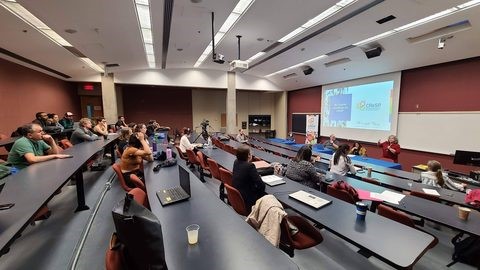
Event on January 9, 2023
In early January 2023, GREZOSP members gathered for a meal to celebrate the new year! Caroline Kilsdonk, a member of the executive committee, took care of organizing and hosting this gathering to kick off the new year. After opening remarks by Director Hélène Carabin and Nicholas Ogden, Caroline presented a video capsule highlighting the importance of the One Health approach, which is deeply embedded in GREZOSP’s projects. She also invited members to share their accomplishments and help promote them. The members then enjoyed a friendly afternoon together, sharing a meal provided by the group
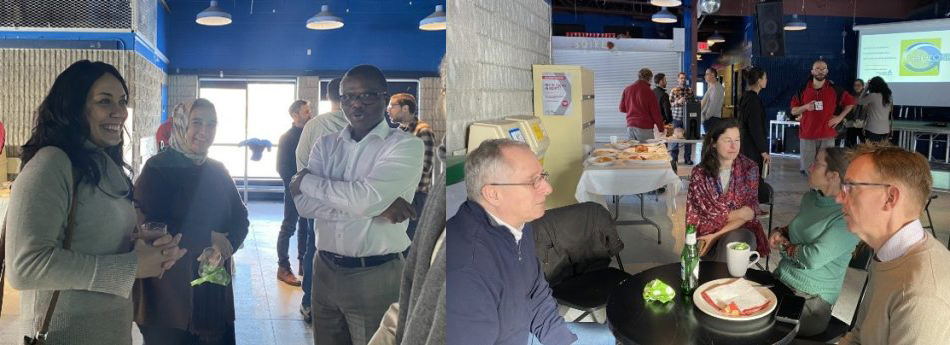
Sucessfully defended theses
Ariane Dumas, a doctoral student supervised by Patrick Leighton, a professor at the Faculté de médecine vétérinaire, and co-supervised by Nicholas Ogden, a researcher at the Public Health Agency of Canada (PHAC).
« Eco-épidémiologie spatiale de la tique à pattes noires et de ses pathogènes dans un parc naturel du sud du Québec ».
In northeastern North America, the Ixodes scapularis tick species is the most common, and it is a vector for several zoonotic pathogens, including the one that causes Lyme disease.
Her project aimed to gather comprehensive data from an urban fringe natural park in southern Québec. The objectives were to identify the environmental determinants of the spatiotemporal distribution of I. scapularis, specify the contribution of host species to the enzootic circulation of its pathogens, identify park characteristics associated with both human visitation and the abundance of infected ticks, and develop a methodology to map the risk of human-tick contact in public parks. The data aimed to demonstrate the importance of fine-scale eco-epidemiological processes in the dynamics of diseases transmitted by this tick.

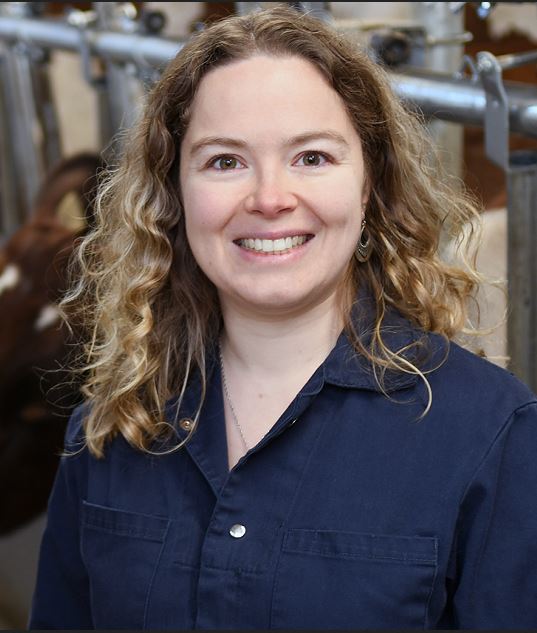
Hélène Lardé, a PhD student under the supervision of Simon Dufour and co-supervised by Marie Archambault and David Francoz, all professors at the Faculté de médecine vétérinaire.
« Comparaison de méthodes de quantification afin de proposer un système de surveillance de l’utilisation des agents antimicrobiens dans les fermes bovines laitières du Québec ».
Quantifying antimicrobial use (AMU) is a key element of antimicrobial resistance surveillance programs. This thesis aimed to evaluate several methods of quantifying AMU in Québec dairy farms. Specifically, it aimed to define a unit of measurement for antimicrobials suitable for the Canadian context, determine the average annual AMU rate in Québec dairy farms, and compare different quantification methods to identify a potential AMU surveillance method in Québec. An observational cohort study was conducted on a sample of 101 dairy farms. AMU quantification was performed using different methods and compared to one year of data collection on drug packaging and feed mill invoices for medicated feed.
Camille Guillot, a PhD student under the supervision of Patrick Leighton, a professor at the Faculté de médecine vétérinaire, and co-supervised by Catherine Bouchard, a researcher at the Public Health Agency of Canada (PHAC).
« La surveillance sentinelle pour les maladies vectorielles : une étude de cas de la maladie de Lyme au Canada »
In Canada, Lyme disease has been identified as a priority emerging infectious disease. Sentinel surveillance, if effective, can monitor the evolving landscape of a disease. The first objective of this thesis was to evaluate the representativeness of acarological sentinel surveillance in describing the risk of Lyme disease in Québec. The second objective was to develop a standardized holistic approach for the selection of sentinel sites that could optimize the spatial design of the surveillance system, and apply this approach to the creation of a new acarological surveillance network in Canada.
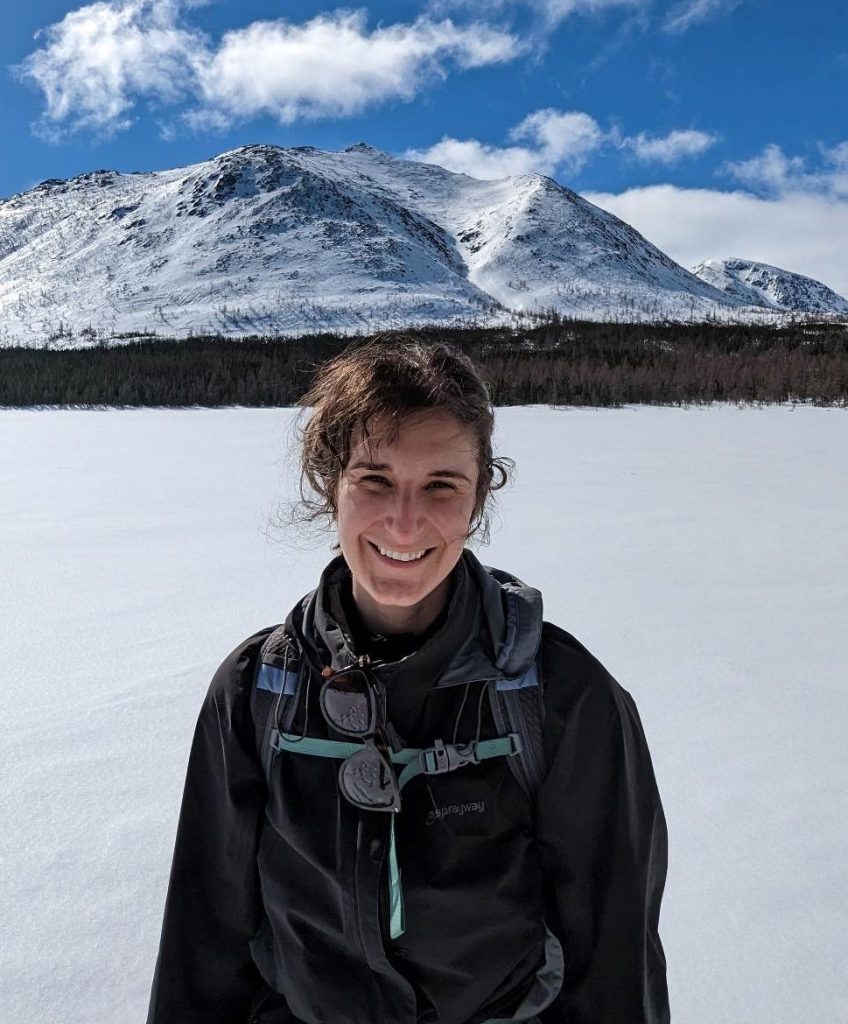

Laurence Daigle, a master’s student supervised by Cécile Aenishaenslin and co-supervised by André Ravel, professors at the Faculté de médecine vétérinaire.
« Connaissances, attitudes et pratiques face aux chiens et aux morsures dans un contexte autochtone nordique »
Her research project aimed to study dog bites in two northern Indigenous communities in Québec. The study revealed that 21% of people in these communities had experienced a dog bite in their lifetime. Furthermore, this research identified a lack of awareness and knowledge about dog bites and the risks of rabies in both communities. Considering that rabies is endemic in the wild canid populations in these regions, these results are particularly worrying. They provide important knowledge for the development of community-based interventions.
Liliana Potes, a master’s student under the supervision of Cécile Aenishaenslin and co-supervised by Jean-Philippe Rocheleau and Catherine Bouchard, professors at the Faculté de Médecine Vétérinaire.
« Évaluation d’une intervention intégrée Une seule santé pour réduire le risque de la maladie de Lyme sur le territoire de la ville de Bromont »
Her project aimed to evaluate an integrated “One Health” intervention in the municipality of Bromont, in Estrie, between 2019 and 2020. This intervention included two components: an environmental component and a community component. The environmental component aimed to reduce the number of ticks infected with Borrelia burgdorferi using an oral acaricide. The community component, directly related to her master’s project, involved a series of activities carried out with the Bromont community to raise awareness among citizens and identify the role of community members in disease prevention through their participation in the project…


Fidele Kabera, a PhD student under the supervision of Simon Dufour and co-supervised by Jean-Philippe Roy, professors at the Faculté de médecine vétérinaire.
« Traitement antibiotique sélectif au tarissement des vaches laitière »
The objective of this thesis was to shed more light on the decisions regarding targeted antimicrobial treatment for infected quarters or cows at dry-off. The results showed that selective treatment would reduce the use of antimicrobials at the time of dry-off, without negative effects on udder health or milk production during the first months of subsequent lactation, if and only if internal teat sealants are used for quarters not treated with antimicrobials. Producers could consider using only the last pre-dry-off somatic cell count (SCC) test as a potential tool to identify cows that should be treated with antimicrobials at dry-off. However, adding a bacteriological milk culture per quarter on Petrifilm® for cows identified as infected based on pre-dry-off SCC data would improve the test’s accuracy and further reduce the use of antimicrobials.
List of publications under the GREZOSP affiliation in 2022-2023
This list covers the period from April 1, 2022 to March 31, 2023.
Guillot C, Bouchard C, Aenishaenslin C, Berthiaume P, Milord F, Leighton PA. Criteria for selecting sentinel unit locations in a surveillance system for vector-borne disease: A decision tool. Front Public Health. 2022 Nov 10;10:1003949. doi: 10.3389/fpubh.2022.1003949. PMID: 36438246
Daigle L, Delesalle L, Ravel A, Ford B, Aenishaenslin C. Occurrence and Risk Factors of Dog Bites in Northern Indigenous Communities: A Scoping Review. Front Vet Sci. 2022 Apr 18;9:777640. doi: 10.3389/fvets.2022.777640. Erratum in: Front Vet Sci. 2022 Jul 18;9:971946. PMID: 35518635
Yuan P, Tan Y, Yang L, Aruffo E, Ogden NH, Bélair J, Arino J, Heffernan J, Watmough J, Carabin H, Zhu H. Modeling vaccination and control strategies for outbreaks of monkeypox at gatherings. Front Public Health. 2022 Nov 25;10:1026489. doi: 10.3389/fpubh.2022.1026489. PMID: 36504958
Hammond-Collins K, Tremblay M, Milord F, Baron G, Bouchard C, Kotchi SO, Lambert L, Leighton P, Ogden NH, Rees EE. An ecological approach to predict areas with established populations of Ixodes scapularis in Quebec, Canada. Tick Borne Dis. 2022 Sep 15;13(6):102040. doi: 10.1016/j.ttbdis.2022.102040. Epub ahead of print. PMID: 36137391.
Jackson EE, Janitz AE, Carabin H. A Method to Create Directed Acyclic Graphs from Cycles of Transmission of Zoonotic and Vector-Borne Infectious Agents. Vector Borne Zoonotic Dis. 2023 Mar;23(3):129-135. doi: 10.1089/vbz.2022.0040. Epub 2023 Feb 27. PMID: 36847355.
Delesalle L, Sadoine ML, Mediouni S, Denis-Robichaud J, Zinszer K, Zarowsky C, Aenishaenslin C, Carabin H. How are large-scale One Health initiatives targeting infectious diseases and antimicrobial resistance evaluated? A scoping review. One Health. 2022 Mar 24;14:100380. doi: 10.1016/j.onehlt.2022.100380. PMID: 35386427
Guillot C, Bouchard C, Buhler K, Dumas A, Milord F, Ripoche M, Pelletier R, Leighton PA. Sentinel Surveillance Contributes to Tracking Lyme Disease Spatiotemporal Risk Trends in Southern Quebec, Canada. Pathogens. 2022 May 2;11(5):531. doi: 10.3390/pathogens11050531. PMID: 35631052
Zinck CB, Thampy PR, Rego ROM, Brisson D, Ogden NH, Voordouw M. Borrelia burgdorferi strain and host sex influence pathogen prevalence and abundance in the tissues of a laboratory rodent host. Mol Ecol. 2022 Nov;31(22):5872-5888. doi: 10.1111/mec.16694. Epub 2022 Sep 27. PMID: 36112076.
Canuti M, Rodrigues B, Bouchard É, Whitney HG, Lang AS, Dufour SC, Verhoeven JTP. Distinct epidemiological profiles of porcine circovirus 3 and fox circovirus in Canadian foxes (Vulpes spp.). Curr Res Microb Sci. 2022 Aug 27;3:100161. doi: 10.1016/j.crmicr.2022.100161. PMID: 36518163
Burrows H, Slatculescu AM, Feng CX, Clow KM, Guillot C, Jardine CM, Leighton PA, Krause PJ, Kulkarni MA. The utility of a maximum entropy species distribution model for Ixodes scapularis in predicting the public health risk of Lyme disease in Ontario, Canada. Ticks and Tick Borne Dis. 2022 Sep;13(5):101969. doi: 10.1016/j.ttbdis.2022.101969. Epub 2022 May 21. PMID: 35640345.
Um MM, Castonguay MH, Arsenault J, Bergeron L, Côté G, Fecteau G, Francoz D, Giguère J, Amine KM, Morin I, Dufour S. Estimation of the accuracy of an ELISA test applied to bulk tank milk for predicting herd-level status for Salmonella Dublin in dairy herds using Bayesian Latent Class Models. Prev Vet Med. 2022 Sep;206:105699. doi: 10.1016/j.prevetmed.2022.105699. Epub 2022 Jun 22. PMID: 35780658.
Aenishaenslin C, Charland K, Bowser N, Perez-Trejo E, Baron G, Milord F, Bouchard C. Behavioral risk factors associated with reported tick exposure in a Lyme disease high incidence region in Canada. BMC Public Health. 2022 Apr 22;22(1):807. doi: 10.1186/s12889-022-13222-9. PMID: 35459149
Bouchard E, Sharma R, Hernández-Ortiz A, Buhler K, Al-Adhami B, Su C, Fenton H, Gouin GG, Roth JD, Rodrigues CW, Pamak C, Simon A, Bachand N, Leighton P, Jenkins E. Correction to: Are foxes (Vulpes spp.) good sentinel species for Toxoplasma gondii in northern Canada? Parasit Vectors. 2022 Apr 25;15(1):146. doi: 10.1186/s13071-022-05277-9. Erratum for: Parasit Vectors. 2022 Apr 1;15(1):115. PMID: 35468834
Dumas A, Bouchard C, Dibernardo A, Drapeau P, Lindsay LR, Ogden NH, Leighton PA. Transmission patterns of tick-borne pathogens among birds and rodents in a forested park in southeastern Canada. PLoS One. 2022 Apr 7;17(4):e0266527. doi: 10.1371/journal.pone.0266527. PMID: 35390092
Yuan P, Tan Y, Yang L, Aruffo E, Ogden NH, Bélair J, Heffernan J, Arino J, Watmough J, Carabin H, Zhu H. Assessing transmission risks and control strategy for monkeypox as an emerging zoonosis in a metropolitan area. J Med Virol. 2023 Jan;95(1):e28137. doi: 10.1002/jmv.28137. Epub 2022 Sep 23. PMID: 36089815.
Keller L, Stelzle D, Schmidt V, Carabin H, Reinhold AK, Keller C, Welte TM, Richter V, Amos A, Boeckman L, Harrison W, Winkler AS. Community-level prevalence of epilepsy and of neurocysticercosis among people with epilepsy in the Balaka district of Malawi: A cross-sectional study. PLoS Negl Trop Dis. 2022 Sep 15;16(9):e0010675. doi: 10.1371/journal.pntd.0010675. PMID: 36108075
Millar N, Aenishaenslin C, Lardé H, Roy JP, Fourichon C, Francoz D, Paradis MÈ, Dufour S. Evidence of a decrease in sales of antimicrobials of very high importance for humans in dairy herds after a new regulation restricting their use in Quebec, Canada. Zoonoses Public Health. 2022 Jun;69(4):370-381. doi: 10.1111/zph.12929. Epub 2022 Feb 24. PMID: 35199952.
Pelletier J, Rocheleau JP, Aenishaenslin C, Dimitri Masson G, Lindsay LR, Ogden NH, Bouchard C, Leighton PA. Fluralaner Baits Reduce the Infestation of Peromyscus spp. Mice (Rodentia: Cricetidae) by Ixodes scapularis (Acari: Ixodidae) Larvae and Nymphs in a Natural Environment. J Med Entomol. 2022 Nov 16;59(6):2080-2089. doi: 10.1093/jme/tjac106. PMID: 35980603.
Daigle L, Ravel A, Rondenay Y, Simon A, Mokoush KN, Aenishaenslin C. Knowledge, attitudes, and practices regarding dogs and dog bites in Indigenous northern communities: A mixed methods study. Front Vet Sci. 2023 Feb 20;10:1080152. doi: 10.3389/fvets.2023.1080152. PMID: 36891468
Bouchard C, Dumas A, Baron G, Bowser N, Leighton PA, Lindsay LR, Milord F, Ogden NH, Aenishaenslin C. Integrated human behavior and tick risk maps to prioritize Lyme disease interventions using a ‘One Health’ approach. Ticks and Tick Borne Dis. 2023 Mar;14(2):102083. doi: 10.1016/j.ttbdis.2022.102083. Epub 2022 Nov 19. PMID: 36435167.
Buhler K, Bouchard É, Elmore S, Samelius G, Jackson J, Tomaselli M, Fenton H, Alisauskas R, Jenkins E. Tularemia above the Treeline: Climate and Rodent Abundance Influences Exposure of a Sentinel Species, the Arctic Fox (Vulpes lagopus), to Francisella tularensis. Pathogens. 2022 Dec 24;12(1):28. doi: 10.3390/pathogens12010028. PMID: 36678376
Acheson ES, Viard F, Buchanan T, Nituch L, Leighton PA. Comparing Control Intervention Scenarios for Raccoon Rabies in Southern Ontario between 2015 and 2025. Viruses. 2023 Feb 14;15(2):528. doi: 10.3390/v15020528. PMID: 36851742
Mosnier E, Loubiere S, Monfardini E, Alibert A, Landier J, Ninoves L, Bosetti T, Auquier P, Mosnier M, Wakap SN, Warszawski J, Tinland A. Cumulative incidence of SARS-CoV-2 infection within the homeless population: insights from a city-wide longitudinal study. BMJ Open. 2023 Feb 23;13(2):e065734. doi: 10.1136/bmjopen-2022-065734. PMID: 36822808
Stelzle D, Makasi C, Schmidt V, Trevisan C, Van Damme I, Ruether C, Dorny P, Magnussen P, Zulu G, Mwape KE, Bottieau E, Prazeres da Costa C, Prodjinotho UF, Carabin H, Jackson E, Fleury A, Gabriël S, Ngowi BJ, Winkler AS. Efficacy and safety of antiparasitic therapy for neurocysticercosis in rural Tanzania: a prospective cohort study. Infection. 2023 Mar 24:1–13. doi: 10.1007/s15010-023-02021-y. Epub ahead of print. PMID: 36961623
Pelletier J, Guillot C, Rocheleau JP, Bouchard C, Baron G, Bédard C, Dibernardo A, Lindsay LR, Leighton PA, Aenishaenslin C. The added value of One Health surveillance: data from questing ticks can provide an early signal for anaplasmosis outbreaks in animals and humans. Can J Public Health. 2023 Apr;114(2):317-324. doi: 10.17269/s41997-022-00723-8. Epub 2022 Dec 5. PMID: 36471231; PMCID
Millar N, Dufour S, Lardé H, Roy JP, Belloc C, Francoz D, Paradis MÈ, Archambault M, Fairbrother JM, Aenishaenslin C. Barriers and facilitators to implementing a new regulation restricting antimicrobial use in dairy production in Québec, Canada: A qualitative study. Front Vet Sci. 2023 Mar 16;10:1025781. doi: 10.3389/fvets.2023.1025781. PMID: 37008362
Tardy O, Acheson ES, Bouchard C, Chamberland É, Fortin A, Ogden NH, Leighton PA. Mechanistic movement models to predict geographic range expansions of ticks and tick-borne pathogens: Case studies with Ixodes scapularis and Amblyomma americanum in eastern North America. Ticks and Tick Borne Dis. 2023 Mar 28;14(4):102161. doi: 10.1016/j.ttbdis.2023.102161. Epub ahead of print. PMID: 36996508.
Management Team
Executive Committee
Hélène Carabin
Directrice du GREZOSP et professeure titulaire à la FMV
Caroline Kilsdonk
Conseillère de recherche, GREZOSP
Patrick Leighton
Directeur adjoint du GREZOSP et professeur titulaire à la FMV
Board of directors
President
Jean-Pierre Lavoie
Vice-doyen à la recherche à la FMV
Members
Hélène Carabin
Directrice du GREZOSP et professeure titulaire à la FMV
Julie Paré
Épidémiologiste à la Direction générale des Sciences de l’Agence canadienne d’inspection des aliments et professeure associée à la FMV
Nicholas H. Ogden
Directeur de la Division Science des risques pour la santé publique au Laboratoire national de microbiologie @ St-Hyacinthe/Guelph de l’Agence de la santé publique du Canada
Jean-Philippe Rocheleau
Professeur / Responsable de la coordination départementale au Département de Santé animale du Cégep de Saint-Hyacinthe et professeur associé à la FMV
Scientific Committee
Hélène Carabin
Directrice du GREZOSP et professeure titulaire à la FMV
Manon Racicot Vétérinaire épidémiologiste principale à l’Agence canadienne d’inspection des aliments
Antoinette Ludwig
Vétérinaire épidémiologiste à l’Agence de la santé publique du Canada et professeure associée à la FMV
Jérôme Pelletier
Étudiant au doctorat en épidémiologie à la FMV
Mohamed Rhouma
Professeur adjoint à la FMV
Patricia Turgeon
Chef de section et épidémiologiste à l’Agence de la santé publique du Canada et professeure associée à la FMV




